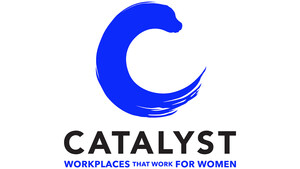NEW YORK, April 28, 2021 /PRNewswire/ -- A new study from Catalyst reveals 94% of men surveyed experience masculine anxiety at work, including 22% who experience high levels. Masculine anxiety is often heightened by combative work cultures and linked to men's decisions not to interrupt sexism in the workplace.
The report, Masculine Anxiety and Interrupting Sexism at Work, defines "masculine anxiety" as the distress men feel when they do not think they are living up to society's rigid standards of masculinity.
Catalyst researchers Sarah DiMuccio, Negin Sattari, PhD, Emily Shaffer, PhD, and co-author Jared Cline surveyed more than 1,000 men across job levels working in the United States, finding 76% of men who experience a high degree of masculine anxiety said that they would do nothing if a colleague makes a sexist comment at work, compared to just 14% of men who experience less masculine anxiety.
The study also found that:
- 1 in 4 men (28%) said they would be likely to do nothing if their colleague makes a sexist comment. 99% of men indicated that their workplace has any level of combative culture, and 33% said that there is a highly combative culture within their workplace.
- In workplaces with a highly combative culture:
- 61% of men said they would do nothing, compared to only 12% of men who work in less combative workplaces.
- 55% of men report having a high degree of masculinity anxiety, compared to only 6% of men working in less combative workplaces.
- Companies can mitigate masculine anxiety and sexism by improving workplace fairness by increasing transparency; clarifying expectations; sharing resources equitably; communicating inclusively; encouraging humility and listening to employees
"This series on Interrupting Sexism provides compelling guidance for senior leaders working to build more inclusive workplace cultures," said Catalyst President and CEO Lorraine Hariton. "The definition of masculine anxiety and data on the role it plays gives talent managers insights to help transform their organizational culture and develop an environment where everyone can thrive at work."
Interrupting Sexism at Work is a research initiative exploring organizational conditions that encourage or discourage men from responding when they witness incidences of sexism in the workplace. The initiative includes countries in North America, Europe, and Asia Pacific. This report is the third in the series and is based on data from the United States.
Our first study, Interrupting Sexism at Work: How Men Respond in a Climate of Silence, highlights the negative impacts of a climate of silence in the workplace on men's intention to comment on observed sexist behaviors. It showed that men who experience higher levels of silence in their workplace see more costs and fewer benefits in interrupting sexist behaviors in the workplace.
The second study, Interrupting Sexism at Work: What Drives Men to Respond Directly or Do Nothing?, examined the role that personal agency and organizational conditions play in predicting men's responses to workplace sexism. In particular, we found that negative organizational environments such as a climate of silence, a climate of futility, and combative culture are responsible for a large portion of men's intent to do nothing in response to workplace sexism.
This third study draws from results from a large-scale survey and insights from in-depth interviews. We surveyed 1,007 men who were employed full-time in the US labor market. They represent a diverse group, spanning a range of industries, organizational ranks, job tenure, ages, and ethnic backgrounds.
Men's Stories of Interrupting Sexism, a report that features insights from interviews, was published on April 27.
Learn more and download the study here.
About Catalyst
Catalyst is a global nonprofit working with some of the world's most powerful CEOs and leading companies to help build workplaces that work for women. Founded in 1962, Catalyst drives change with pioneering research, practical tools, and proven solutions to accelerate and advance women into leadership—because progress for women is progress for everyone.
Contacts:
Naomi R. Patton
Vice President, Media & Public Relations
Catalyst
[email protected]
Stephanie Wolf
U.S. Communications Consultant
Catalyst
[email protected]
SOURCE Catalyst

Related Links
WANT YOUR COMPANY'S NEWS FEATURED ON PRNEWSWIRE.COM?
Newsrooms &
Influencers
Digital Media
Outlets
Journalists
Opted In





Share this article